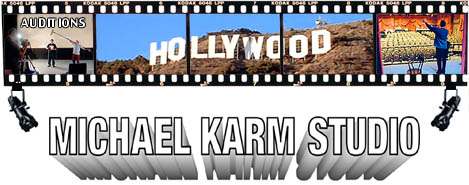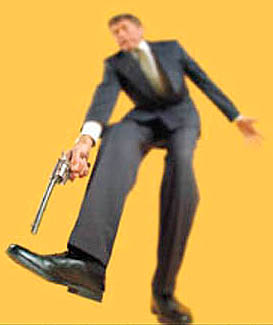
Director  Private Acting Coach
Private Acting Coach  Theatrical Consultant
Theatrical Consultant
What happens to
"YOUR TECHNIQUE" when you walk into an Audition,
or when a Stage Manager calls "Curtain Going UP"
or you hear the word "Action?"
About Method
After years of watching good actors successfully
perform scenes in class yet, somehow, remain unable to transfer
that success to real auditions, I created my Simulated Audition
Class at the Manhattan Theatre Club in New York City.
The class sought to duplicate the actual
audition experience, allowing actors to identify and isolate
all of the feelings experienced in an authentic audition situation.
How do you feel as you wait in the reception
area, are called in for an interview, must perform a monologue,
prepare for a cold reading or a callback, or must bring in a
role after having had time to work on the part? And, more importantly,
what do you do with those feelings?
There are and have been many audition training
classes offered, but it was in that "Twilight Zone"
where actors fell into the crack of the "unknown transition"
of walking into a cold room, where they would often complain,
"What happened to my _ _ _ _ing technique when I walked
into that _ _ _ _ing audition?"
After uncovering what I would label, the
actor's "hidden, undermining negativity," l worked
on providing a specific, tailored technique, encompassing a clear
understanding of each actor's inner fears, conflicts, anxiety
and tension in order to liberate him/her and provide the ability
to utilize all of their talent, and focus fully on acting
the role and winning the part.
Even if an actor is considered "not
right" for a part, he or she certainly would be memorable
for the range of talent and ability they are able to demonstrate
in each audition. This, in turn, sets the stage for future
employment. If you have access to all of your emotions, in
any role, understand risk-taking and following your selected
intentions toward fulfilling your character's objective, you
will be called in again and again by casting directors who just
want someone to be able to "do the job."
After moving to Los Angeles in 1980, I
enjoyed several featured roles in network TV series and in film.
After experiencing first-hand the various challenges faced by
actors working on the set, l began teaching a class at Studio
City's Actors Center. l called this class "Emotional Self-Direction,"
and designed a method guaranteed to bring the actor fully
to the task of characterization and heightened reality immediately
as the director calls "Action!" An actor, confronted
with the fast pace of film and television work, must be able
instantaneously to access and deliver his truest, deepest
self to the task at hand. I have since incorporated "ES-D"
into my Audition Class work.
Besides the repetition of practice, there
were times actors would uncover a specific problem which I advised
them to take to their therapist. Acting may be therapeutic, but
it is definitely not therapy! Working on clearing up past trauma,
unblocking and freeing oneself toward fuller emotional health
will allow an artist to use all of the colors and hues on their
palette for multi-leveled performances in every medium.
I feel that my self-actualization and auditioning
techniques are unimpeachably established and guaranteed to be
infallible.
Coaching Announcement with Testimonials:


























